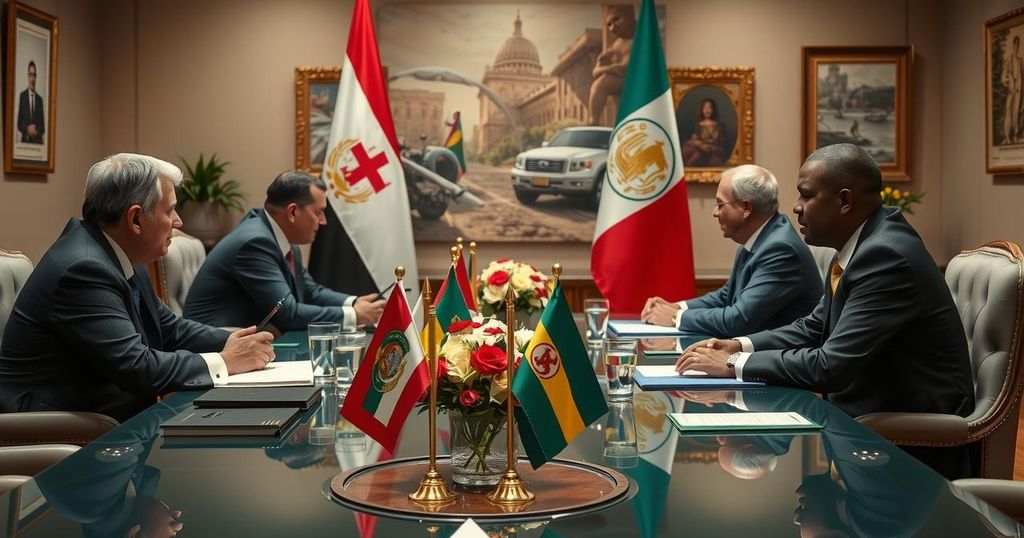Tensions Rise as Ethiopia Seeks Replacement of Somalia’s Foreign Minister

Somali FM Ahmed Fiqi faces potential replacement amid tension with Ethiopia and Egypt. President Hassan Sheikh Mohamud visits Ethiopia for diplomatic ties, while Fiqi consults with Egypt and Eritrea. Domestic and regional tensions persist regarding Somalia’s foreign policy and alliances, as critics question the coherence of the administration’s approach.
Ethiopia is reportedly advocating for the replacement of Somalia’s Foreign Minister, Ahmed Fiqi, creating tensions amidst Somalia’s diplomatic initiatives. Concurrently, Somali President Hassan Sheikh Mohamud is engaged in discussions with Ethiopian Prime Minister Abiy Ahmed, resulting in the revival of diplomatic relations between the two nations. Significantly, Foreign Minister Fiqi is absent from this trip, as he is attending talks in Egypt with officials from Egypt and Eritrea, focusing on bolstering their trilateral alliance against Ethiopian influence.
President Hassan Sheikh’s recent dealings appear aimed at diminishing ties with regional Somali member states, notably Puntland and Jubaland, which have historically maintained strong relations with Ethiopia. The Ethiopian government has long established security partnerships with these regions, crucial for countering various regional threats, including militant activities across borders. Additionally, Somalia’s recent agreement to integrate Ethiopian forces within its peacekeeping framework underscores Ethiopia’s role in the country’s security landscape.
Egypt’s resistance to the proposed change in Foreign Minister signals the broader geopolitical rivalry within the Horn of Africa, as Egypt seeks to maintain its influence in Somalia amidst Ethiopia’s rising power. This situation is reminiscent of previous political tensions, such as the dismissal of former Somali intelligence chief Mahad Salad over perceived alignments with Egyptian interests, raising questions regarding Ahmed Fiqi’s future. Critics of President Hassan Sheikh’s foreign policy have articulated concerns over its coherence, suggesting that it prioritizes personal agendas over national interests, thus exposing Somalia to foreign encroachments that could impede its sovereignty and recovery.
The ongoing tug-of-war between Ethiopia and Egypt continues to illustrate the fragility of Somalia’s political climate, highlighting the complexities of regional diplomacy and influence. As both nations vie for leverage, the implications for Somalia’s sovereignty and governance remain significant, necessitating careful navigation by its leadership amidst these geopolitical currents.
The political landscape in the Horn of Africa is defined by intricate relations among countries such as Somalia, Ethiopia, and Egypt. Historically, Ethiopia has been a key player in Somali security dynamics, fostering alliances with regional federal states like Puntland and Jubaland for strategic purposes. Conversely, Egypt has recently intensified its partnership with Somalia and Eritrea through a trilateral framework, viewing it as a necessary measure to counterbalance Ethiopia’s growing regional clout. Such dynamics foster ongoing tensions that affect Somalia’s internal politics and external relations.
In summary, the intricate dynamics of Ethiopia’s ambitions to replace Somalia’s Foreign Minister Ahmed Fiqi, amid President Hassan Sheikh Mohamud’s discussions in Ethiopia, underscore the ongoing geopolitical contest in the Horn of Africa. The strong opposition from Egypt highlights the critical balance of power at play, with implications for Somalia’s governance and its response to foreign influence. This situation poses significant challenges to Somalia’s sovereignty and necessitates a reassessment of its foreign policy framework to navigate the evolving regional landscape effectively.
Original Source: www.garoweonline.com








